| |

|
DeLoG NEWSLETTER
No. 54 – 03/2021
|
|

|
| |
|
|
| |
Dear Reader,
welcome to issue No. 54 of the DeLoG Newsletter which showcases the Network’s most recent activities and offers an overview of current news stories, upcoming events and courses.
In our “In-Profile” section, we introduce you to Mike Keshishian from USAID (United States Agency for International Development) who shares his perspective on the benefits of decentralisation, the need for cooperation across all governmental levels and how COVID-19 has impacted USAID's work globally.
Last month the DeLoG Secretariat launched its new and exciting exchange format “DeLoG in DialoGue” and successfully hosted its first session. Moreover, the month of February signified an important landmark in the cooperation with the Asian Development Bank (ADB), as a Letter of Intent (LoI) between both parties was formally signed, paving the way for joint future activities.
In recognition of International Women's Day many of our Members and Partners published insightful resources and programmes in the field of gender equality. You can find different online tools and publications that connect urban planning and gender-inclusivity launched by the DLG-community in our News and Knowledge section.
We hope you will enjoy this issue and encourage you to forward our Newsletter to others interested in Decentralisation and Local Governance.
All the best and stay healthy!
Your DeLoG Team
Contact: info@delog.org |
|
|

© Mike Keshishian
|
|
In-Profile – Mike Keshishian, United States Agency for International Development (USAID)
"At USAID, we facilitate decentralization because we believe that it can promote 1) democratization, 2) economic growth, and 3) stability. We do not want to only improve governance: we want to improve democratic or good governance.''
In his interview Mike Keshishian provides us with insights into USAID's approach to decentralisation, discusses their recently published study on decentralised governance and accountability and the importance of future research on local governance in its different settings.
Access his full interview on our homepage.
|
| |
|
|
| |
|
|
|
|
|
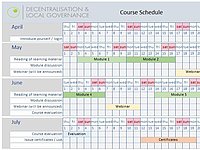
© DeLoG Secretariat
|
|
Tutored DeLoG E-Learning Course on "Enhancing the Effectiveness of Decentralisation and Local Governance Reforms"
Apply now to take part in DeLoG's newly revised E-Learning Course on “Enhancing the Effectiveness of Decentralisation and Local Governance Reforms”. To learn more about the course's target group, methodology, timeline and on how to sign up please take a closer look at the course announcement. Spots are limited. The deadline for applications is 11th of April 2021.
|
| |
|
|
| |
|
|
|
|
|
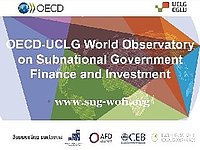
© SNG WOFI
|
|
DeLoG Launches its first "DeLoG in DiaLoGue" Event: Meeting on the World Observatory on Subnational Government Finance and Investment (SNG-WOFI)
On the 4th of February 2021, DeLoG invited Members and Partners to participate in its first "DeLoG in DiaLoGue" event. This brand-new online exchange format aims to provide Members and Partners with a space to pitch innovative ideas and call on the expertise and help of the Network on short notice. The first event, hosted by OECD and UCLG as lead partners of the World Observatory on Subnational Government Finance and Investment (SNG-WOFI), was dedicated towards determining how DeLoG Members and Partners can be involved and help prepare for the next edition of the World Observatory’s Report, to be released in 2022. Through the format our colleagues from OECD and UCLG were able to gain quick access to the high-level expertise and specific country data of DeLoG Members and Partners.
|
| |
|
|
| |
|
|
|
|
|
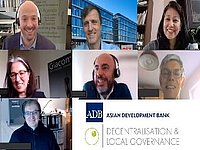
© DeLoG / ADB
|
|
Asian Development Bank (ADB) and DeLoG Secretariat, Represented by Deutsche Gesellschaft für Internationale Zusammenarbeit (GIZ), Sign Letter of Intent to Deepen Collaboration
On the 19th of February 2021 the Asian Development Bank (ADB) and DeLoG, represented by Deutsche Gesellschaft für Internationale Zusammenarbeit (GIZ), signed a cooperation agreement. Focused on strengthening institutional capacity for localising the SDGs, the cooperation agreement was signed by Bruno Carrasco, appointed Director General effective 22nd of February (concurrently Chief Compliance Officer, Sustainable Development and Climate Change Department), and Dr. Armin Nolting, Head of the Advisory Project on Governance, GIZ. Represented by Ursula Keller Alazzawi, Senior Policy Advisor at Swiss Development Cooperation (SDC), and Achim Johannsen, Senior Policy Advisor at the German Federal Ministry for Economic Cooperation and Development (BMZ), DeLoG’s Strategic Support Group underlined the importance of this Letter of Intent to strengthen collaboration between ADB and DeLoG’s Members and Partners.
|
| |
|
|
| |
|
|
|
|
|
News from our Members and Partners
|
|
|
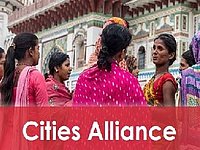
© Cities Alliance
|
|
Cities Alliance Provides Insightful Overview of the "Cities for Women" Resource Collection and Project
To set the tone for their upcoming projects Cities Alliance has reviewed the work done by the “Cities for Women” Project dedicated to promoting gender equality and to empowering women and girls in 2020. Through sharing the accomplishments from the diverse projects implemented across the globe, this overview gives access to recordings, reports and articles related to the three parts of the programme: Local participatory action and research, cross-support and gender-mainstreaming as well as the global platform for knowledge exchange.
|
| |
|
|
| |
|
|
|
|
|
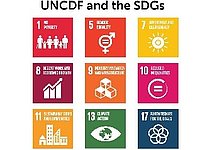
© UNCDF
|
|
UNCDF Provides New Knowledge Source for Local Inclusive Finance for the 2030 Agenda
The United Nations Capital Development Fund (UNCDF) has developed a knowledge platform on local development finance and financial inclusion to support the Sustainable Development Goals (SDGs). This homepage caters specifically to stakeholders in search of resources for this particular field. Publications and videos on public and private finance, the impacts of the different financing models at local level and more topics related to local finance can be easily accessed.
|
| |
|
|
| |
|
|
|
|
|

© USE / Metropolis city network
|
|
Urban Sustainability Exchange (USE) Offers Insight into the Horizonte 2030 Project Implementation in the City of Belo Horizonte
Kick-started in 2020, the Brasilian City of Belo Horizonte is in the implementation process of a programme aimed at localising multiple international development agendas, like the Agenda 2030 and the New Urban Agenda, in its municipality. Including public administration staff, academia, the private sector and civil society, the city follows a "leave no one behind"-approach in its aspiratin to improve public services and progress the city economically, environmentally and socially. Documenting the process, USE provides insight into the ongoing programme and the progress made.
|
| |
|
|
| |
|
|
|
|
|
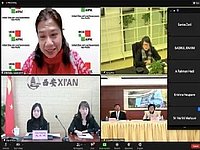
© UCLG ASPAC
|
|
UCLG ASPAC Joins Forces with City of Guangzhou in the Localisation of the Agenda 2030 and Women Empowerment
Accompanied by a webinar on "Empowering Women in the COVID-19 Era", UCLG ASPAC and the city of Guangzhou signed an agreement to jointly commit to the implementation of a two-year-programme on enhancing cooperation in their work for the localisation of the Agenda 2030 and women empowerment. UCLG ASPAC's Standing Committee of Women in Local Governments (SCWLG) and the Guangzhou International Award for Urban Innovation serve as major platforms for localising the Sustainable Development Goals (SDGs) in the region. The agreement provides new possibilities for activities like a pilot project in Guangzhou focussed on women's and children’s health as well as joint learning activities.
|
| |
|
|
| |
|
|
|
|
|
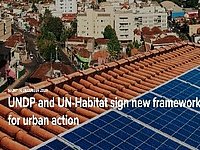
© UN-Habitat / UNDP
|
|
UNDP and UN-Habitat Sign a New Framework for Urban Action
The new joint collaborative framework signed by the United Nations Development Programme (UNDP) and the United Nations Human Settlements Programme (UN-Habitat) aims to support countries and cities in their COVID-19 recovery process and provide guidance on how to prepare for a better response to future crises. The partnership framework focusses on five key areas, recognising that urbanisation can be a tool for tackling development challenges and implementing the 2030 Agenda. It aims at supporting countries in developing National Urban Policies (NUPs) as well as financing frameworks to not only deliver local development agendas, but also ensure the crucial role cities play in national economies.
|
| |
|
|
| |
|
|
|
|
|
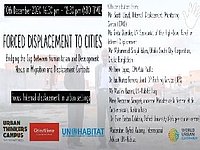
© Cities Alliance
|
|
Cities Alliance Recaps Successful Urban Thinkers Campus Series in Partnership with UN-Habitat
To round off its three-part virtual series on forced displacement in cities, the Urban Thinkers Campus series follows up on the successful exchange by summarizing highlights and key messages. The sessions, hosted by UN-Habitat and Cities Alliance, focuses on the Humanitarian Development Nexus in connection with refugees in the urban context. Discussing topics like resettlement and internally displaced people (IDPs), the sessions feature diverse case studies across the continents and speakers from international migration organisations. The recordings, reports and related knowledge resources are now available online.
|
| |
|
|
| |
|
|
|
|
|
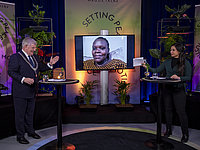
© VNG / Laura Oldenbroek
|
|
VNG Introduces New Format: The "HagueTalks"
The "HagueTalks" creates an online space to listen, exchange and discuss. The Forum strives to be a stage and creative hub for new ideas, innovative minds and game changers in the field of peace and justice. The "HagueTalks" wants to be more than a place for creative discussion, by being a starting point for concrete action. The diverse topics related to peace, local governance and more are presented through live streams, videos, and spin-offs targeting specific groups (like the youth) or regions. Hosted live from a studio in the Hague, a key online event about the role of local governments in peacebuilding, in the framework of the UCLG Peace Prize was held in March.
|
| |
|
|
| |
|
|
|
|
|

© UNCDF
|
|
Meeting the New Head of UNCDF Preeti Sinha via Podcast
Meet the new Executive Secretary of the United Nations Capital Development Fund (UNCDF) Preeti Sinha and listen as she joins Esther Pan Sloane to discuss her plans and vision for UNCDF’s role for local finance. Explaining UNCDF's mandate as unlocking public and private finance for the communities left the furthest behind, Sinha empahsises the agency's contribution to transforming the capital markets to work justly for everyone. Having 30 years of global experience, she will lead the organisation's COVID-response efforts while working to tap into the growth potential of the world's least developed countries (LDCs) with a focus on the local level.
|
| |
|
|
| |
|
|
|
|
|

© Metropolis
|
|
Metropolis Publishes Strategic Action Plan 2021-2023
Metropolis frames the new Strategic Action Plan for the upcoming two years as an effort to not only promote the approaches and ideas that have been communicated by its members worldwide, but to build sustainable and inclusive metropolitan spaces. The Strategic Action Plan recognises cities as carriers for modernisation while having to manage their rapid growth. Strengthened cooperation and exchange, sparked by this year's collective response to the critical challenges posed by the COVID-19 pandemic have motivated Metropolis to provide more directions and better ideas for metropolitan spaces to address challenges and problems in a joint manner.
|
| |
|
|
| |
|
|
|
|
|
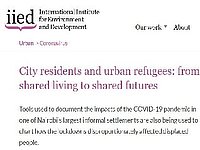
© IIED
|
|
IIED Study Highlight the Needs of Urban Refugees and Slum Dwellers International's (SDI) work in Nairobi
The documentary portraying the experiences of refugee households living in the informal settlement of Mathare in Nairobi (Kenya) accompanied by Lucy Earle's article provide a comprehensive understandig of the way the COVID-19 pandemic has impacted an urban community that is traditionaly forgotten by local relief networks. Documenting the disproportion in negative impacts on displaced persons in context of the global health crisis, the lockdown measures hit informal settlements and specifically the refugees living there on a large scale. The researcher highlights the work done by the community-based organisation Slum Dwellers International (SDI) DI Kenya, and carves out how approaching urban rights and planning from a local level is key for a more inclusive and sustainable recovery and future.
|
| |
|
|
| |
|
|
|
|
|
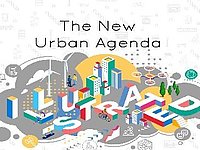
© UN-Habitat
|
|
The New Urban Agenda Illustrated
The New Urban Agenda (NUA), launched in October 2016, provides standards and principles for sustainable inclusive urbanisation. The newly published illustrated handbook aims to enable a better understanding and therefore implementation of its agenda by mapping three core thematic blocks. Synergies between the NUA's goals and the SDGs are also visualised, including added action proposals and examples from across the globe. Addressing all urban stakeholders, the new design tries to give a comprehensive overview of challenges and policies related to urban development. The Handbook therefore acts as a knowledge basis for actors in the field.
|
| |
|
|
| |
|
|
|
|
|

© OECD / TEDxTalk
|
|
Aziza Akhmouch's Inspiring TEDxTalk (in French)
In her inspiring TEDxTalk "Mes 3 solutions pour la ville de demain", Aziza Akhmouch takes the listeners on a journey of reborn cities while illustrating how to get there. The head of the Cities, Urban Policies and Sustainable Development Division at the OECD Centre for Entrepreneurship, SMEs, Regions and Cities, lays out her key solutions for the future of sustainable cities by drawing upon her expertise and OECD's work in urban and metropolitan policy.
|
| |
|
|
| |
|
|
|
|
|

© ICLEI
|
|
ICLEI World Congress 2021 - 2022
When: 13 – 15 April 2021 (online) & second quarter of 2022 (Malmö, Sweden)
Where: Blended (Online, Malmö)
Apply by: Registration opens in mid-March 2021
Changing the World Congress to a two-part event, this year's virtual part will be dedicated to the Network's strategic direction as well as regional and local governments' contributions to the UN Decade of Action. The second part of the World Congress is scheduled to take place next year in Malmö, Sweden if the global health crisis permits. The in-person second part aims to foster exchange and inspiration by sharing best practices in the field of local sustainable development and initiatives implemented in Malmö and shall serve as a first-hand learning resource on urban sustainability.
|
| |
|
|
| |
|
|
|
|
|
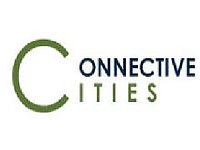
© Connective Cities
|
|
Virtual Connective Cities Dialogue Event for Sub-Saharan Africa
When: 11 May 2021 – 14 May 2021
Where: Online
Apply by: 31 March 2021
Uniting urban professionals form sub-Saharan Africa and Germany, the goal of this virtual dialogue event is the exchange of expertise on topics in the field of land use planning and management. Hosted by Connective Cities, the dialogue aims to showcase adoptable pragmatic approaches, applicable to different local contexts, as well as good practices from municipalities divers in their local conditions.
|
| |
|
|
| |
|
|
|
|
|
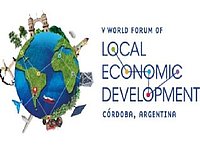
© UNDP
|
|
5th World Forum of Local Economic Development
When: 26 May 2021 – 01 June 2021
Where: Online
Apply by: TBA
Building up to a biennial world event, the Forum is an ongoing process that advocates for a global dialogue and the sharing of experience on Local Economic Development (LED) worldwide. This year's fifth world event will be held completely online while being hosted by the city of Córdoba, Argentina. Focusing on the most pressing challenges in the context of LED, the Forum's agenda 2021 is tailored towards times of crisis and the role territories can play to support sustainable local development. Uniting a diverse group of stakeholders, the participants joining the event comprise national and subnational government leaders and professionals from the private sector, academia and civil society.
|
| |
|
|
| |
|
|
|
|
|
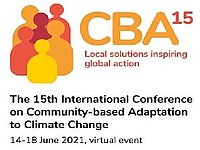
© IIED
|
|
15th International Conference on Community-Based Adaptation to Climate Change (CBA15)
When: 14 June 2021 - 18 June 2021
Where: Online
Apply by: Registration open
The CBA15 will virtually unite practitioners, grassroots representatives, local and national government planners, policymakers and donors to discuss and exchange on the actions needed for a climate-resilient future. Taking place online, the virtual agenda will allow stakeholders worldwide to interact, share innovations and connect for action.
|
| |
|
|
| |
|
|
|
|
|
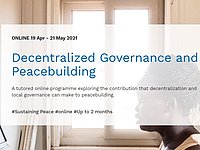
© UNSSC
|
|
Decentralized Governance and Peacebuilding
When: 19 April - 21 May 2021
Where: Online
Apply by: 15 April 2021
|
| |
|
|
| |
|
|
|
|
|
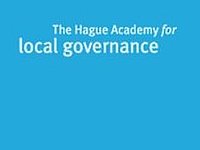
© The Hague Academy for Local Governance
|
|
Multilevel Water Governance
When: 6 September - 17 September 2021
Where: The Hague
Apply by: 30 July 2021
|
| |
|
|
| |
|
|
|
|
|

© ICLD
|
|
Introduction to the 2030 Agenda
When: Self-paced
Where: Online
Apply by: Registration open
|
| |
|
|
| |
|
|
|
|
|
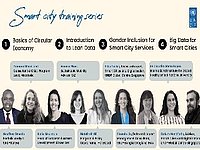
© UNDP
|
|
Smart Cities Training Series
When: Self-Paced
Where: Online
Apply by: Registration open
|
| |
|
|
| |
|
|
|
|
|
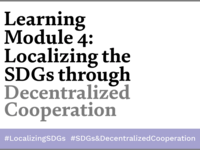
© UCLG
|
|
New Learning Module 4 on Decentralised Cooperation and SDGs
When: Self-Paced
Where: Online
Apply by: Registration open
|
| |
|
|
| |
|
|
|
|
|
Knowledge
|
|
|
Fragility ● Post-conflict Settings ● Migration
|
|
|
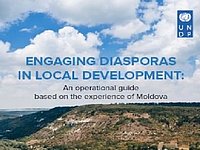
© UNDP
|
|
Engaging Diasporas in Local Development: An Operational Guide Based on the Experience of Moldova
The United Nations Development Programme's (UNDP) guide provides insight and approaches on diaspora investement in local development, based on the Migration and Local Development Project (MiDL), a project funded by the Swiss Government between 2015 and 2018. Using the specific project in Moldova, the guide showcases practical steps to successful support local governments in developing and implementing policies linkining diaspora and migration to local development processes. The guide underscores the importance of establishing partnerships with international agencies like the United Nations, national and local governments, the private sector as well as local civil society and other stakeholders.
Publisher: United Nations Development Programme
Publication Date: 2020
Copyright: United Nations Development Programme
|
| |
|
|
| |
|
|
|
|
|
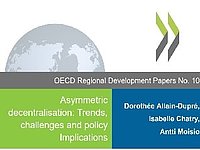
© OECD
|
|
Asymmetric Decentralisation. Trends, Challenges and Policy Implications.
Tackling the topic of asymmetric decentralisation, this OECD Regional Development Paper analyses this current trend which can be observed predominately in urban areas across the globe. The authors shed light on the impact the COVID-19 pandemic could play in exhilarating it even stronger by providing rationals and trends in he conttext of asymmetric decentralisations as well as lessons for policy-makers. Defining this specific kind of decentralisation as "differentiated assignments of competencies across subnational governments, for the same level of administration", the authors explain the different territorial and policy levels it occurs at. Uniting economic research and policy practice the paper provides recommendations and lessons learned when assessing the benefits and challenges in implementing asymmetric decentralisation.
Authors: Dorothée Allain-Dupré, Isabelle Chatry, Antti Moisio
Publication Date: 2020
Copyright: OECD
|
| |
|
|
| |
|
|
|
|
|
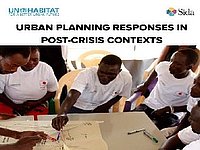
© UN-Habitat / Sida
|
|
Urban Planning Responses in Post-Crisis Contexts
This UN-Habitat publication connects urban planning and holistic post-crisis responses by using the stragies and lessons retrieved from its Urban Planning and Design Lab set in the time frame of the 2014 - 2019 Strategic Plan. To give guidance to practitioners in the field and to fruther connect the urban planning and humanitarian communities, the publication explains the strategies developed for effective planning support and tooals as part of the Lab's acitivities. The ten stratgies highlight the importance of connecting and aligning with the perspective and role of local governments as well as the need of an urban strategic plan to function as a fitting management tool for local actors. The publication provides detailed case studies from across the continents for more practical recommendations and examples.
Publisher: UN-Habitat
Publication Date: 2020
Copyright: UN-Habitat
|
| |
|
|
| |
|
|
|
|
|
Fiscal Decentralisation ● Local Finance
|
|
|
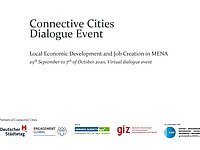
© Connective Cities
|
|
Local Economic Development and Job Creation in MENA
The report reflects the main results produced during the five session-virtual dialogue event organised by the Connective Cities project in September and October 2020. Uniting over 40 local urban practitioners from 10 countries, the dialogue united the MENA region and Germany on the topic of Local Economic Development (LED) and the facilitation of peer-to-peer learning and exchange. LED being a priority for the MENA rcountries, the dialogue event aimed at enhancing the capacity of the participating municipal representatives to analyse and plan in the field of LED and job creation programmes while facing the current economic and systematic challenges.
Author: Shalan Muna
Publisher: Connective Cities
Publication Date: 2020
Copyright: Connective Cities
|
| |
|
|
| |
|
|
|
|
|
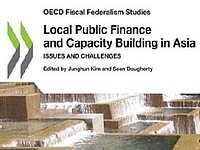
© OECD
|
|
Local Public Finance and Capacity Building in Asia - Issues and Challenges
The comprehensive OECD publication identifies the prerequisite for beneficial decentralisation in the capacity of subnational governments (SNG) to effectively fund and deliver public services. At the same time the publication highlights the challenges posed to subnational capacity development like inadequate public financial management, weak tax administration as well as lacking intergovernmental transfers. Aiming to showcase how resource constraints on SNG can be eased while simulteanously improving their performance, the publication features perspecitives from Asia ans specific case studies from Inda and China.
Publishers: OECD, Korea Institute of Public Finance
Publication Date: 2020
Copyright: OECD, Korea Institute of Public Finance
|
| |
|
|
| |
|
|
|
|
|
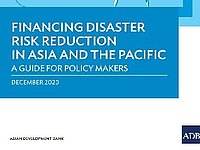
© Asian Development Bank (ADB)
|
|
Financing Disaster Risk Reduction in Asia and the Pacific: A Guide for Policy Makers
Recognising that disaster occur to a large extent in Asia and the Pacific, this publication by the Asian Development Bank (ADB), focuses on disaster risk reduction finance and its instruments. The publication serves as a guide to stakeholders and policy makers alike on financing opportunities, practical information based on case studies in the region and recommendations for government policies. With future climate and other disaster risks to come, the ADB publication stresses the need for scaling up the financing of disaster risk managment instruments and mechanisms.
Publisher: Asian Development Bank (ADB)
Publication Date: 2020
Copyright: Asian Development Bank (ADB)
|
| |
|
|
| |
|
|
|
|
|
2030 Agenda ● Localising the SDGs
|
|
|

© UNDESA / UNDP
|
|
What is a Good Practice? A Framework to Analyse the Quality of Stakeholder Engagement in Implementation and Follow-Up of the 2030 Agenda
United in their development of an analytic framework, UN DESA and UNDP provide stakeholders with a tool to examine the quality of their implementation practices of the 2030 Agenda. The guide identifies the gaps and different stages of the countries’ implementation strategies and aims to enable the stakeholders to recognise their specific weaknesses and strengths with this shared framework. Moreover, the framework serves as a starting point for stronger exchange by sharing different engagement practices, lessons learned and good practices. By including the COVID-19 pandemic's impact on the 2030 Agenda implementation processes, the guide places an emphasis on enabling coherent efforts and addressing challenges to come.
Publisher: UNDESA, UNDP
Publication Date: 2021
Copyright: UNDESA, UNDP
|
| |
|
|
| |
|
|
|
|
|
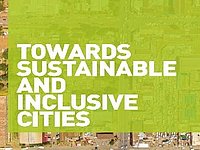
© SymbioCity / SKL International
|
|
Implementing Agenda 2030 through SymbioCity: Experiences from Cities on Four Continents
Connecting the Decade of Action of the 2030 Agenda with the challenge of rapid urbanisation, the SymbioCity Guide illustrates how supporting local and regional governments (LRGs) in the planning and development of processes is a keystone for sustainable and inclusive cities. SymbioCity is an approach and methodology that based its development on the successful experiences of local governments in Sweden and worldwide and has eversince been used to support LRGs in over 15 countries across the globe. The case studies illustrate how the Sustainable Development Goals (SDGs) and the New Urban Agenda (NUA) can provide guidance for projects that aim for more inclusive and sustainable cities and enhancing their capacity development.
Publisher: SymbioCity, SKL International
Publication Date: 2021
Copyright: SymbioCity, SKL International
|
| |
|
|
| |
|
|
|
|
|
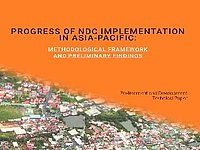
© UNESCAP
|
|
Progress of NDC Implementation in Asia-Pacific – Methodological Framework and Preliminary Findings
The preliminary findings just published by UN-ESCAP, UNEP and Greenwerk assess the progress of Nationally Determined Contribution (NDC) implementation in Asia-Pacific and provide a methodology for understanding the ambition behind them. Analysing enabling and inhibiting factors, the publication links them to specific countries and their progress in their implementation process and gives recommendations to achieve the ambitiously set pledges. Seeing how the NDCs can be connected to a green and inclusive post-COVID-19 recovery strategy, the assessment's results on missing coordination with sub-national and local governmental institutions and the usage of their data is a ciritical finding. Furthermore, the lack of local financial frameworks in the region and the need for a greater inclusion and consideration of the local contexts, practices and stakeholders are key findings.
Publisher: United Nations Economic and Social Commission for Asia and the Pacific (UN-ESCAP)
Publication Date: 2020
Copyright: UN-ESCAP
|
| |
|
|
| |
|
|
|
|
|
Urban and Territorial Governance
|
|
|
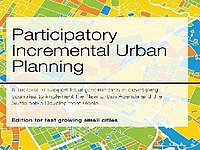
© UN-Habitat
|
|
Participatory Incremental Urban Planning - A Toolbox to Support Local Governments in Developing Countries to Implement the New Urban Agenda and the Sustainable Development Goals
Publishing an edition specifically for fast growing small cities, the Participatory Incremental Urban Planning (PIUP) is a methodology toolbox that enables users to assess, design, operationalise and implement urban planning processes step-by-step. The PIUP addresses all urban stakeholders and due to its structure as a guide it allows them to easily follow the single steps and create a timeline for the phases. Divided into blocks and activities, the guide visualises urban planning processes from their start up to their implementation and evalutation while covering the steps inbetween. The guide includes further helpful resources and international Agendas to consult while indicating the stages of an urban planning process, that provide opportunities for local actors' participation.
Publisher: UN-Habitat
Publication Date: 2020
Copyright: UN-Habitat
|
| |
|
|
| |
|
|
|
|
|
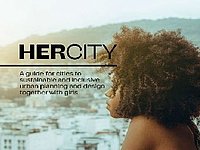
© UN-Habitat
|
|
Her City – A Guide for Cities to Sustainable and Inclusive Urban Planning and Design together with Girls
The HerCity Guide follows from the Urban Girls Movement, funded by the Swedish International Development Cooperation Agency (Sida) and is a joint urban development initiative by UN-Habitat and the Global Utmaning (Global Challenge) think tank. Published on International Women's day 2021, the guide aims to capture methods and tools that efficiently enhance equality and inclusion in urban development. Making this instruments available to urban actors across the globe, the guide's goal is to help cities in mainstreaming girls' participation in the planning process and establish it as a standard in urban sustainability strategies. Providing a step-by-step methodology for the implementation process, HerCity also encompasses an open digital platform aiming to provide space and enhance the dialogue between professionals and citizens.
Publisher: UN-Habitat
Publication Date: 2021
Copyright: UN-Habitat
|
| |
|
|
| |
|
|
|
|
|
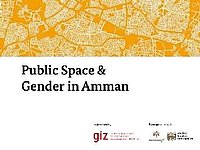
© Deutsche Gesellschaft für Internationale Zusammenarbeit (GIZ) GmbH
|
|
Gender & Public Spaces in Amman
Taking the history of the male centered creation of cities around the world as a starting point, the publication uses the Jordanian capital Amman as a case study to and guide for urban practitioners and scholars. As numerous cities have acknowledged the existing imbalance, Amman is one of the city that strengthens its focus on more gender-inclusive planning approaches. The study analyses the state of gender in public spaces and provides practical guidelines as ideas and innovative approaches for public space projects. Encompassing a question pool and a ethnographic guide for further independent research, the report furthermore includes an analysis of five public space case studies in Amman, presented as urban ethnographies.
Author: Rebekka Keuss
Publisher: GIZ
Publication Date: 2020
Copyright: GIZ
|
| |
|
|
| |
|
|
|
|
| |

|
|
|
| |
|
|
| |
For access to even more inspiring publications on
1. DLG in Contexts of Fragility, Migration and Post-Conflict Settings,
2. Fiscal Decentralisation and Local Finance,
3. Localising the 2030 Agenda or
4. Urban and Territorial Governance
make sure to visit the regularly updated "Knowledge Section" of our DeLoG Website!
|
|
|





































